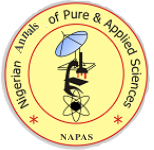Editorial Comments
River Benue, Going!! Going!!!
The Zambezi River basin, which stretches across 8 countries in Southern Africa - Angola, Botswana, Malawi, Mozambique, Namibia, Zambia, Tanzania and Zimbabwe - has lost a significant portion of its fresh water due to pollution, climate change and poor management. Satellite measurements, detailing the falling water levels of Lake Victoria are also mapped. Africa's largest freshwater lake is now about a meter lower than it was in the early 1990s.
Lake Chad has literally gone from being an oasis in the desert, to being just desert. Spanning the countries of Chad, Nigeria, Niger and Cameroon and bordering the Sahara desert, Lake Chad has contracted by a massive 95% between 1963 and 2001. It is obvious that the same fate that befell these major water bodies in Africa is imminent in River Benue. The second largest river in Nigeria deriving its source from the mountains of Northern Cameroon and winding its way through Adamawa, Taraba, Benue, and ending at the confluence in Kogi States. Over 40 million Nigerians depend on River Benue for their livelihood and/or source of water.
At the current rate of silting resulting from poor management, change in rainfall pattern resulting from climate change and pollution arising from human activities, it is possible to estimate that River Benue is seeing her last decades. This drastic reduction in the volume and size is most obvious during dry season.
It is therefore very important to alert stakeholders that River Benue is going and going. Other impacts, some natural and some human-made and which can only be truly appreciated from space, include the extensive deforestation around the River Benue. The vegetation loss is as a result of emerging charcoal business.
River Benue, the lifeblood of its 40 million beneficiaries, can also be the potential lubricant for future conflict. Water scarcity, intensified by climate change, completes a conflict cocktail that includes surging populations, the spread of disease, oppression and corruption. Nigeria is already grappling with challenges of terrorism as a result of disappearing Lake Chad and other factors, an eminent Water War in the Benue Trough could precipitate catastrophic consequences for this region. The region of the Benue is already experiencing violent conflict between herdsmen and farmers resulting from in ability to sustainably share a common resource.
The Editorial Board of the Nigeria Annals of Pure and Applied Sciences hope these images of Nigeria's lakes and river will galvanize scholars and contributors to greater interest and research action in order to conserve and restore these crucial water bodies. Economically lakes are of huge importance. In the United States, for example, the value of freshwaters for their recreational value alone is estimated at $37 billion in a year.
The Editorial Board also hopes that the images will ring a warning around the country that, if we are to overcome poverty and meet internationally agreed development goals by 2020, the sustainable management of Nigeria's freshwater resources must be part of the national equation. Otherwise, we face increasing tensions and instability as rising populations compete for life's most precious of precious resources.
The emerging challenge for Nigeria's scientific community is stimulating serious awareness amongst the general population through research-based evidence in order to generate political commitment to save and restore the dwindling glories of our lakes and rivers.
Navigating ahead, the Editorial Board of NAPAS will be happy to disseminate research findings that will not only mobilise political stakeholders but also stimulate community participation in strategies to restore and save River Benue from extinction. We have continued to position NAPAS to be the first choice journal for scholars in Nigeria. Our online presence has continued to draw significant attention from the scholarly community.
The Editorial Board is grateful to the Vice-Chancellor, Prof. Msugh Moses Kembe for ensuring that the TETFUND support attracted in 2016 is judiciously utilized for the production of the Journal.
On behalf of the Editorial Board, I wish our ever-increasing cream of readers and contributors a fruitful and productive engagement with NAPAS and a memorable Christmas holiday.
Professor Edward Agbo Omudu
Professor of Parasitology and Entomology
Editor-in-Chief.


 Contact Us
Contact Us Editorial Team
Editorial Team Join As A Reviewer
Join As A Reviewer  Request For Print Copy
Request For Print Copy


 Cprint Publishers
Cprint Publishers